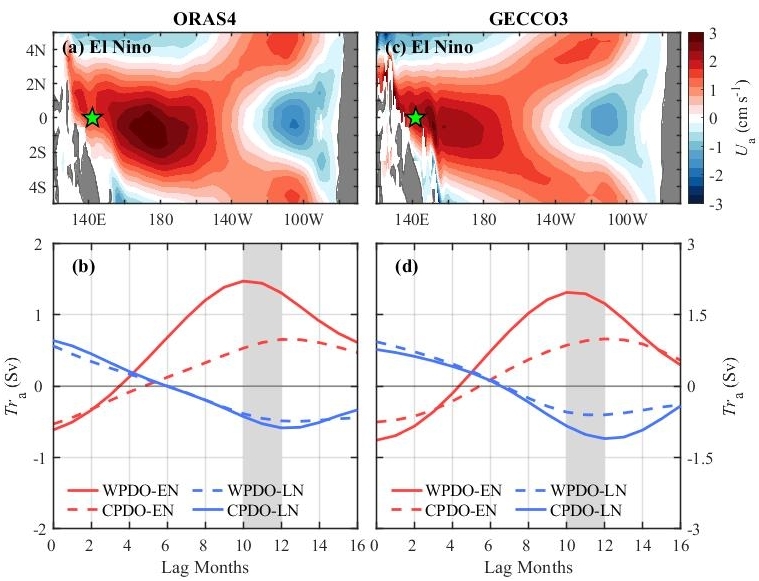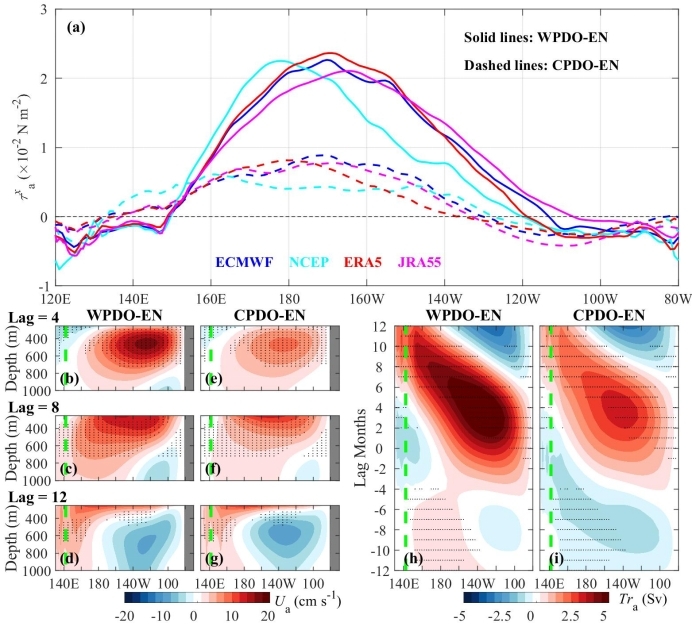The Equatorial Intermediate Currents (EICs) contribute to global circulation, climate variability, and distributions of heat, watermass, and biogeochemical quantities.
In the past few years, the research team led by Prof. WANG Fan from the Institute of Oceanology of the Chinese Academy of Sciences (IOCAS) had documented the intraseasonal, seasonal, and interannual variability of the EICs in the western Pacific. The EICs in the western Pacific show a significant interannual response to El Nino-Southern Oscillation (ENSO) at a 10-12-month lag, with an eastward transport anomaly (Tra) during the El Nino events.
Recently, the research team further demonstrated that the El Nino-related eastward Tra can be modulated by the Pacific Decadal Oscillation (PDO).
The study was published in Geophysical Research Letters on Mar. 22.
Based on results from two long-record reanalysis products, researchers ascertained that the PDO modulation effects are embodied in two aspects. First, the magnitude of the maximum eastward Tra during the warm PDO-El Nino is nearly twice as large as that during the cold PDO-El Nino. Second, the occurrence time of the largest eastward Tra for warm PDO-El Nino leads that for cold PDO-El Nino by about 2 months.
Researchers further performed model experiments to explore the underlying mechanism. The above modulation is closely related to the wind forcing in the equatorial central Pacific. In the warm PDO phase, the enhanced and eastward-displaced anomalous westerly winds can induce the Kelvin waves with an intensified amplitude and eastward shift. These eastward propagating waves are reflected into Rossby waves at the Pacific eastern boundary. The westward and downward propagation of such Rossby waves induce the larger and earlier peaked eastward Tra.
"This study interconnects the PDO with the EICs, and expands the knowledge of intermediate current variability to an interdecadal timescale. Such variability has potential consequences for long-term inter-basin exchanges of mass, heat, and biogeochemical properties," said Prof. WANG.
The research was supported by National Natural Science Foundation of China and the Strategic Priority Research Program of Chinese Academy of Sciences.

Fig. 1 (top) Anomalous EICs at a 10-12-month lag after the peak month of the El Nino events. (bottom) Composite Tra based on the relative phases of ENSO and PDO.

Fig. 2 Composite zonal wind stress anomaly over the equatorial band and Tra difference between warm PDO-El Nino and cold PDO-El Nino with the westward and downward propagation of the Rossby waves
Ma, Q., Wang, J.*, Wang, F.*, Lyu, Y., & Zhang, Z. (2022). Interdecadal modulation of ENSO-related anomalous Equatorial Intermediate Currents in the western Pacific by the PDO. Geophysical Research Letters, 49, e2022GL098409.
Wang, J., Ma, Q., Wang, F.*, & Zhang, D. (2021). Linking seasonal-to-interannual variability of intermediate currents in the southwest tropical Pacific to wind forcing and ENSO. Geophysical Research Letters, 48, e2021GL092440. https://doi.org/10.1029/2021GL092440
Ma, Q., Wang, J.*, Wang, F.*, Zhang, D., Zhang, Z., & Lyu, Y. (2020). Interannual variability of lower equatorial intermediate current response to ENSO in the western Pacific. Geophysical Research Letters, 47, e2020GL089311. https://doi.org/10.1029/2020GL089311
Zhang, Z., Pratt, L., Wang, F., Wang, J.*, & Shuwen, T. (2020). Intermediate intraseasonal variability in the western tropical Pacific ocean: meridional distribution of equatorial Rossby waves influenced by a tilted boundary. Journal of Physical Oceanography, 50(4), 921-933. https://doi.org/10.1175/JPO-D-19-0184.1
WANG Jianing
Institute of Oceanology
E-mail: wjn@qdio.ac.cn
(Editor: ZHANG Yiyi)
|
|

Address: 7 Nanhai Road, Qingdao, Shandong 266071, China
Tel: 86-532-82898902 Fax: 86-532-82898612 E-mail: iocas@qdio.ac.cn


